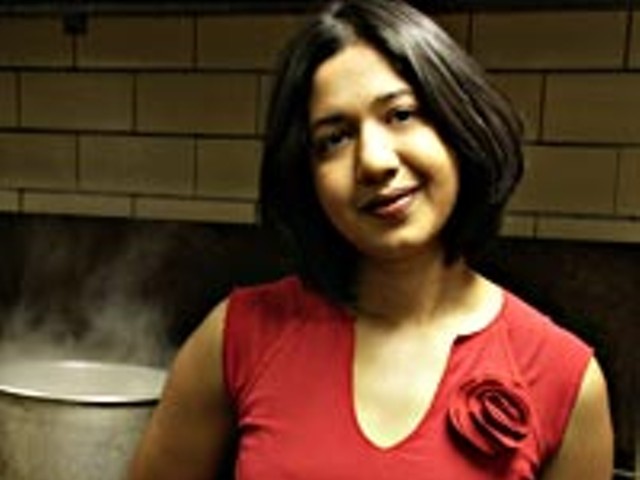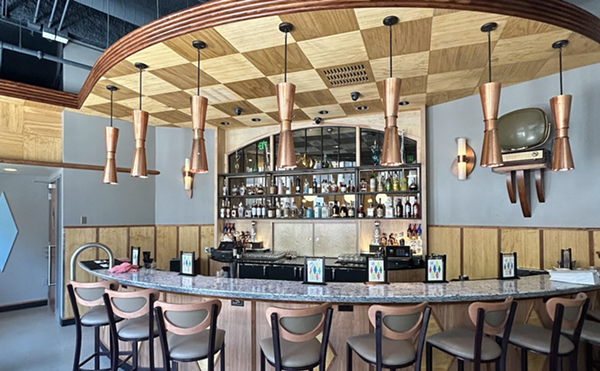When U.S. Rep. John Dingell met with Arab-American community leaders on Sept. 19, the gathering took place at the New Yasmeen Bakery in Dearborn. Wayne County Executive Ed McNamara and congressional wife Judy Bonior also held meetings there, designed to open doors in the wake of the terrorist attacks.
But Souad Bazzi was unfazed by the big shots, preparing her usual dishes in her usual unruffled manner. Cooking appears to come naturally to the shy, soft-spoken Bazzi, the oldest of seven sisters and four brothers.
Although she’s clearly in charge of the New Yasmeen kitchen, Bazzi is no executive chef, planning the meals that others prepare. Clad in a paper cap and a kelly-green apron, she concocts 20 different Lebanese dishes each day, stirring baklet bandoura with one hand while mashing hummus with the other. And making it all look easy.
A good number of Bazzi’s offerings are different from those found in other Lebanese restaurants in the area. They’re old recipes, done the old-fashioned way. While she certainly makes shish tawook and chicken shawarma, the steam tables at New Yasmeen are filled with more unusual (to Westerners) dishes such as shoumar (cracked wheat and dill), hendbe (dandelion greens boiled and cooked with olive oil and onions) and kunafa, a traditional Lebanese breakfast.
Bazzi grew up in Bint Jebail in southern Lebanon. Her father left for America to support the family, working at Ford for 35 years and sending money home. Bazzi learned the traditional dishes by watching her mother cook, although her mother gave little formal instruction. “I relied on faith to find out what the ingredients were,” she says, “and I used my family to experiment on.”
Her dishes rely heavily on grains and beans, since meat was a luxury in her mother’s kitchen. Of course, getting your protein from cracked wheat and lentils is now regarded by the health-conscious as the thing to do, in a country so rich that we are oversupplied with animal protein.
“My grandmother lived to 100 and she ate once a month meat,” remembers Hussein Siblini, one of three brothers who own New Yasmeen and are Bazzi’s bosses. “She only used olive oil, cracked wheat, chickpeas, garlic — all the things we know now are really good for you. Those are really rich in protein. She never had any cholesterol problems.
“These days everybody is complaining about all these diseases coming from fat. So those old dishes really made a comeback.”
At the restaurant, Bazzi is not constrained by the menu, which lists far fewer of her offerings than are displayed for diners. Take her baklet bandoura: cracked wheat, chickpeas and tomatoes (bandoura means tomatoes), a hot dish that I scarfed in her kitchen. It tastes rich because of the onions fried in olive oil and uses a collection of spices called Syrian mix, including cumin.
She also makes a great fateh: chickpeas, yogurt, mint and pine nuts, which is served warm and is, as you might expect, tangy and nutty. One of the better cold dishes not listed is her artichoke salad with lemon and oregano.
Bazzi’s American fans (including many Ford headquarters folks) keep coming back because they discover food they don’t find anywhere else. And Arab-American customers are pleased because, although they recognize the old dishes, they don’t have the time (or often the know-how) to cook them at home. “Too bad,” says Bazzi, because to her all the dishes are easy.
Often they come in for a carry-out breakfast. There are three typical Lebanese breakfasts: The sweet one is kunafa, a pastry made with fine-ground katayfa, cheese and honey or sugar syrup (katayfa is the stuff you usually see shredded for some kinds of baklava). Second is zatar bread with cheese or meat (zatar is thyme and sumac). And third is Bazzi’s specialty, cold foul (pronounced “fool”), which in her interpretation is fava beans and chickpeas marinated with garlic and lemon.
You can also pick up a croissant at the bakery. Bazzi doesn’t make them, but they’re an indication of the strong influence of the French in Lebanon.
Now 52, Bazzi has been in this country for 15 years, is divorced and living with her son Hussein. She first cooked at the now-closed Aladdin restaurant in Dearborn, where one of the Siblini brothers discovered her.
Bazzi has no interest in trying out other restaurants; she’s seen enough food on the job to last a lifetime. At home in Dearborn, she tries to avoid cooking as much as possible. She might make a meal of tomatoes and bread. For Hussein, she’ll cook his favorites: steak, chicken, potatoes, hamburgers.
Ah, the American melting pot. Did I mention that Bazzi makes a thin-crust pizza, with lemon juice, olive oil and lamb?
The New Yasmeen Bakery is at 13900 W. Warren in Dearborn. Call 313-582-6035.
Read other chefs' stories in Chow (this week's special restaurant collection):
• Dish packs another (and another) helping of the East Side’s finest cuisine.
• Eastern paths meet Western ways at the up-to-the-minute Eurasian Grill.
• There are no mad hatters at Fiona’s Tea House, only scones and assorted wonders.
• Misha’s is "home cooking" with a rich and moving past.
• Food for a small planet’s working week at the Small World Café.
• Chef Jeffrey Kalich makes Twingo’s a full-spectrum experience.






